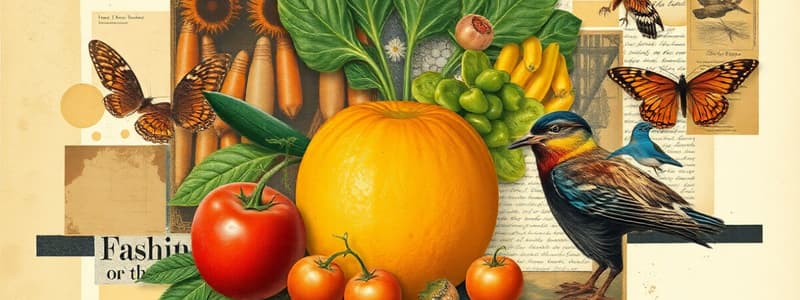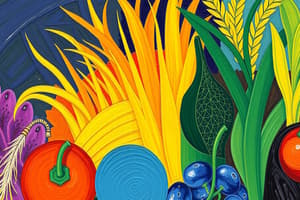Podcast
Questions and Answers
What impact does monoculture farming have on biodiversity?
What impact does monoculture farming have on biodiversity?
- It increases biodiversity by introducing diverse species.
- It increases farming efficiency but reduces biodiversity. (correct)
- It preserves local species and habitats.
- It has no significant impact on biodiversity.
What are the consequences of habitat destruction in agricultural practices?
What are the consequences of habitat destruction in agricultural practices?
- Minimal impact on soil erosion.
- Reduction in biodiversity and increased pollution. (correct)
- Increases in species diversity.
- Improvement of aquatic ecosystems.
How does intensive livestock farming primarily contribute to environmental issues?
How does intensive livestock farming primarily contribute to environmental issues?
- By enhancing biodiversity through varied species.
- By creating sustainable farming practices.
- By causing pollution and raising animal welfare concerns. (correct)
- By utilizing renewable resources efficiently.
What role do conservation efforts play in biodiversity?
What role do conservation efforts play in biodiversity?
What is the primary benefit of using biotechnology with bacteria in medical applications?
What is the primary benefit of using biotechnology with bacteria in medical applications?
How does genetic modification benefit agricultural practices?
How does genetic modification benefit agricultural practices?
Which of the following best describes anaerobic respiration in yeast?
Which of the following best describes anaerobic respiration in yeast?
What is a major consequence of plastic pollution in ecosystems?
What is a major consequence of plastic pollution in ecosystems?
Flashcards
Biodiversity
Biodiversity
Refers to the variety of species in an area. Monocultures increase efficiency but reduce biodiversity.
Habitat Destruction
Habitat Destruction
Caused by land use for crops, livestock, housing, and resource extraction. Leads to pollution of land, freshwater, and seas.
Waterways Pollution
Waterways Pollution
Untreated sewage and fertilizers reduce oxygen, harming aquatic ecosystems.
Genetic Modification (GM)
Genetic Modification (GM)
Signup and view all the flashcards
Why are bacteria used in biotechnology?
Why are bacteria used in biotechnology?
Signup and view all the flashcards
Fermenters
Fermenters
Signup and view all the flashcards
Enzymes in Biotechnology
Enzymes in Biotechnology
Signup and view all the flashcards
Anaerobic Respiration
Anaerobic Respiration
Signup and view all the flashcards
Study Notes
Food Production Impact on Biodiversity and Ecosystems
- Agricultural practices, including machinery, fertilizers, insecticides/herbicides, and selective breeding, are intensifying food production.
- These practices often lead to reduced biodiversity due to monocultures (single crop varieties).
- Intensive livestock farming contributes to pollution, high resource use, and animal welfare issues.
Biodiversity
- Biodiversity refers to the variety of species in a given area.
- Farming practices, especially monoculture, decrease biodiversity by limiting species diversity.
Habitat Destruction
- Conversion of land for crops, livestock, housing, and resource extraction leads to habitat loss.
- This results in pollution across land, freshwater, and seas.
- Deforestation severely impacts habitats, reduces biodiversity, worsens soil erosion, and increases carbon dioxide levels.
Pollution
- Untreated sewage and fertilizers contaminate waterways, reducing oxygen levels and harming aquatic ecosystems.
- Non-biodegradable plastics damage ecosystems and harm animals that ingest or come into contact with them.
- Greenhouse gases (CO2 and methane) released from fossil fuels, livestock, and rice paddies contribute to climate change.
Conservation Efforts
- Conservation strategies aim to protect forests through education, protected areas, logging quotas, replanting, and safeguarding fish stocks via quotas, closed seasons, and regulated fishing methods.
- Species protection involves monitoring habitats, education, captive breeding, and seed banks.
- Conservation is vital for maintaining biodiversity, ecosystem health, and access to essential resources like food, medicine, and genes.
Biotechnology and Genetic Modification
Bacteria in Biotechnology
- Bacteria are valuable for rapid reproduction, creating complex molecules, and offer ethical advantages (e.g., plasmids).
Anaerobic Respiration
- Yeast produces CO2 (which leavens bread) and ethanol (used as biofuel).
Enzymes in Biotechnology
- Pectinase breaks down pectin, enhancing juice yield and clarity.
- Biological washing powders contain enzymes (e.g., protease, lipase) to eliminate stains (proteins/fats/starches).
- Lactase breaks down lactose, benefiting lactose-intolerant individuals.
Fermenters
- Fermenters create controlled environments for growing bacteria/yeast to produce useful products (e.g., ethanol, insulin, CO2).
Genetic Modification (GM)
- Genetic modification alters genetic material through gene removal, insertion, or modification.
Applications of GM
- Bacteria are modified to produce human proteins (insulin, growth hormones) for medical use.
- Herbicide-resistant crops reduce weed control reliance on herbicides.
- Pest-resistant crops minimize pesticide use by making crops resistant to insects.
- Golden rice is enriched with beta-carotene to alleviate vitamin A deficiency.
GM Process
- Restriction enzymes cut human genes; DNA ligase combines them with bacterial plasmids; plasmids are inserted into bacteria.
- Bacteria multiply, expressing the desired protein.
Controversies of GM Crops
- Debates surround the health, environmental, and ethical impacts of GM crops like soybeans, maize, and rice.
Studying That Suits You
Use AI to generate personalized quizzes and flashcards to suit your learning preferences.




